Top 10 Enterprise Content Management software
November 29, 2024 | Editor: Michael Stromann
15
ECM and document management software and cloud services.
1
SharePoint's multi-purpose platform allows for managing and provisioning of intranet portals, extranets and websites, document management and file management, collaboration spaces, social networking tools, enterprise search, business intelligence tooling, process/information integration, and third-party developed solutions. SharePoint can also be used as a web application development platform.
2
Alfresco is a Free enterprise content management system for Microsoft Windows and Unix-like operating systems. Alfresco includes a content repository, an out-of-the-box web portal framework for managing and using standard portal content, a CIFS interface that provides file system compatibility on Microsoft Windows and Unix-like operating systems, a web content management system capable of virtualizing webapps and static sites via Apache Tomcat, Lucene indexing, and Activiti workflow. The Alfresco system is developed using Java technology.
3
OpenText products help organizations put content to work. Whether your goal is to drive revenue, improve productivity, reduce costs or ensure regulatory compliance and sound information governance, OpenText has the product to execute.
4
OpenKM is a web base document management application that uses standards and Open Source technologies. OpenKM provides full document management capabilities including version control and file history, metadata, scanning, workflow, search, and more. It also allows the social activities around content to be used to connect people to other people, information to information, and people to information; helping to manage, more efficiently, the collective intelligence of the human resources of the company.
5
Laserfiche content management, business process automation and data analytics deliver rapid ROI for your organization. Get work done faster with the leading cloud content services platform — featuring low-code process automation, secure content management, intelligent content capture and prebuilt integrations.
6
Document management and workflow automation software. DocuWare digitizes and secures your information to flow effortlessly between your decision makers — anywhere, any device, any time.
7
The M-Files metadata-driven document management platform enables knowledge workers to instantly find the right information in any context, automate business processes, and enforce information control. This provides businesses with a competitive advantage and substantial ROI as they deliver superior customer experiences and higher-quality work with lower risk.
8
Nuxeo provides an Open Source Content Management Platform enabling architects and developers to easily build, deploy, and run content-centric business applications. In the cloud or on premise, Nuxeo's Enterprise Content Management (ECM) technology offers an integrated solution for Document Management, Case Management, Digital Asset Management and much more. Built on a modern, Java-based architecture, the Nuxeo Platform is architected for modularity and extensibility, unlike traditional ECM solutions.
9
OnBase, Hyland’s flagship product, is a single enterprise information platform designed to manage your content, processes and cases. OnBase centralizes your important business content in one secure location, and then delivers relevant information to you when you need it, wherever you are. Increase productivity, deliver excellent customer service and reduce risk across your entire enterprise.
10
LogicalDOC is a document management system software easy-to-use, reliable and affordable, which can improve your business efficiency. The installation and implementation of LogicalDOC's Document Management System software is easy. Irrespective of the type of organization whether large or small, the support, licensing and optional packages are all affordable. LogicalDOC - DMS (Document Management System) greatly facilitates how one manages and process important documents, this eases your job and saves you a lot in terms of monetary value and time waste.
11
IBM ECM delivers high value solutions that can help companies transform the way they do business by enabling them to put content in motion: capturing, activating, socializing, analyzing and governing it throughout the entire lifecycle. FileNet Content Manager provides powerful document management and ready-to-use workflow that helps you capture, manage, and share content.
12
DocuShare is one of the most flexible, easy-to-use content management platforms on the market today. It manages a wide range of paper and digital content and automates your business processes so your organization’s, customers, constituents, and partners can efficiently access, share and process business critical information 24 x 7.
Important news about Enterprise Content Management software
2024. Workday acquired AI-powered document platform Evisort
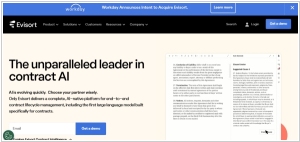
Workday is purchasing Evisort, an AI-driven contract management platform. Evisort will contribute to Workday’s expanding collection of AI-related acquisitions, which began with HR analytics firm Identified in 2014. In 2018, the company acquired SkipFlag, developers of an AI knowledge base that builds itself from an enterprise’s internal conversations. Evisort provides AI-powered modules that enable customers to assess documents like revenue contracts, asset agreements and supplier invoices for things such as omissions and mistakes and receive suggestions on document language. Evisort also helps emphasize key elements in documents such as unclaimed benefits in supplier agreements, assess document language against historical standards and automatically alert customers of significant upcoming file-related dates (e.g., contract renewals).
2022. OpenText acquires Micro Focus for $6B

ECM giant OpenText is acquiring Micro Focus for a total of $6 billion. Micro Focus, a British company, has built much of its business by purchasing legacy software firms like Borland, Novell and Cobol-IT. Its most notable transaction was an $8.8 billion agreement in 2016 to collaborate with HPE on a portion of its enterprise software portfolio. Apart from some of the components in the HPE portfolio, such as the infamous Autonomy acquisition, the majority of Micro Focus’s catalog doesn’t directly align with OpenText’s content management origins. This suggests the deal is more about scaling up rather than creating direct synergy with the acquiring company.
2021. Sanity raises $39M for its “use-anywhere” approach to content repositories
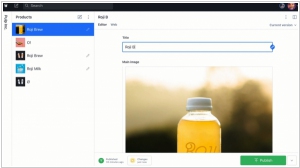
A plucky little startup called Sanity, in what might be described as a particularly inspired act of programming mischief, has cobbled together $39 million to fuel its grand plan of liberating content from its current state of siloed drudgery. They’ve cooked up something called a “content lake” — a structured yet delightfully schema-free reservoir of digital stuff that companies can fish from to repurpose and reuse across an infinity of business scenarios. This is remarkable because, as everyone who has ever wrestled with a conventional CMS (even the newfangled headless ones) will tell you, content has a stubborn habit of being trapped in labyrinthine, purpose-built cages. The result? A slow, glitchy nightmare for anyone brave or foolhardy enough to try bending it to their will. Sanity’s approach is, quite literally, sanity-saving.
2021. Templafy raises $60M for its B2B SaaS platform that does business document creation
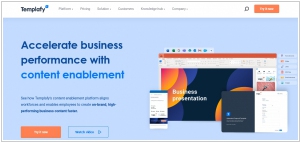
In the sprawling cosmos of business documentation, where chaos and bland formatting reign supreme, Templafy has emerged as the improbably brilliant guide to bring order to the mess. Hailing from Denmark, this B2B SaaS marvel has just pocketed a modest $60 million in a D round—pocket change when you're focused on the galactic scale of enterprise needs. Unlike PandaDoc, which tends to flutter around specific sales-centric constellations, Templafy takes a delightfully agnostic approach, boldly helping employees whip up any business document they fancy, from just about any app they inhabit—be it Office, Google, Salesforce, Teams, or Slack. While others are obsessively vertical, chasing after single-use-case planets, Templafy floats horizontally, solving everything for everyone across massive enterprise universes.
2020. Hyland to acquire Alfresco
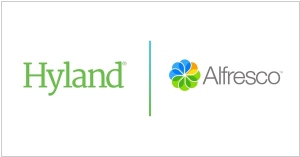
In a move that could be described as both momentous and bewilderingly inevitable, Hyland, a provider of content services of the sort that might one day rule the galaxy (or at least a tidy corner of it), has inked an agreement to acquire Alfresco. Now, Alfresco, if you're not already intimately familiar, is the kind of open-source ECM platform that your highly efficient and slightly pedantic friend would insist is "revolutionary." Founded in 2005 by the legendary John Newton (he of Documentum fame) and John Powell (who once wrangled the operations of Business Objects), Alfresco has been quietly connecting, managing, and safeguarding the critical digital assets of the known universe—or at least Boston, where it's headquartered. With its cloud-native platform and open-source ethos, Alfresco is set to nestle snugly under the umbrella of Hyland Software, Inc. when the deal closes. This acquisition, a big shiny bauble in Hyland's grand quest to dominate the content services cosmos, also opens a doorway to collaborate with the open-source community on product innovation—a prospect likely to make developers and visionaries alike weak at the knees.
2020. Templafy raises $25M to deal with enterprise documents
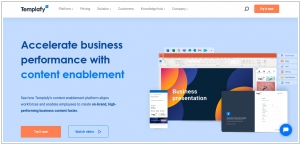
Templafy — which has developed a method for companies to more efficiently create templates from standard documents (yes, it’s a thing) — secured an additional $15 million. The company integrates with enterprise systems to deliver corporate content assets, document templates and automated validation of generated documents for various clients. Templafy faces considerable competition across the different sectors it serves — for instance, in Template Management (Litera); Creative Content (Frontify, Bynder), Sales Enablement (Showpad, Seismic), Proposal Management (Conga, PandaDoc) and Email Signature Management (Exclaimer, Xink).
2019. Salesforce announces new content management system

Salesforce has introduced a new tool called Salesforce Content Management System, which it says is built from the ground up to offer a superior customer experience across various channels. The goal is to allow users to create, manage and deliver more relevant content across multiple platforms within the Salesforce ecosystem. The company asserts that it doesn't require extensive technical expertise, enabling marketers and product teams to produce and deliver content independently of IT support once the system is set up. While users can generate more tailored content based on customer data within Salesforce, the key differentiator is its capability to integrate with external systems. A hybrid CMS offers a native experience channel or touchpoint, but also provides the flexibility to display content on any touchpoint developed on a third-party platform.
2019. Headless CMS company Strapi raises $4 million
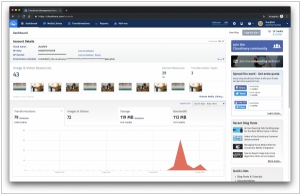
In a galaxy not so far away, a French startup known as Strapi, clearly tired of the mundane constraints of traditional content management systems, has raised a rather charming $4 million to continue its quest for headless CMS dominance. Strapi, an open-source Node.js marvel, has wooed the masses with 500,000 downloads and a hearty band of 250 contributors tinkering away on its open-source project. Anyone with a server and a dream can summon Strapi into existence, craft their own front end, and fetch content for their mobile app via its spiffy API—oh, and there’s more! You can tailor the admin panel to display only the fields you fancy, making content creation almost feel... enjoyable. Compatible with SQLite, MongoDB, MySQL, and Postgres, Strapi seems intent on making itself the universal translator of databases. Future plans involve building an ecosystem of plugins to supercharge the CMS and, eventually, a hosted version for those who’d rather not wrestle with the digital plumbing themselves. All in all, a rather clever enterprise indeed.
2019. Contentstack raises $31.5M Series A round for its headless CMS platform
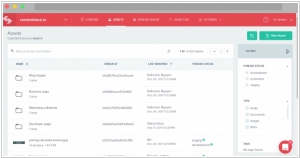
Contentstack, a startup that provides a headless CMS platform for enterprises, today announced that it has secured $31.5 million in Series A funding. The company reports that its revenue grew by 4x in the first half of 2019 compared to the same period last year. Contentstack mentions that it is gaining traction across various sectors, with retail, travel/hospitality, sports/entertainment and tech performing particularly well. Like many companies at the Series A stage, Contentstack plans to use the new investment to expand its sales and marketing team, as well as to develop its partner ecosystem and community around the product. Sampat also indicates that the company intends to extend beyond its core markets of the U.S., India and Europe by entering the APAC region in the first half of 2020, with a primary focus on Australia and New Zealand.
2019. AI contract management startup Icertis raised $115M
Icertis, the startup that develops cloud-based software to help large companies manage contracts, has raised $115 million at more than a billion-dollar valuation to become the latest SaaS unicorn. Icertis lets users manage almost all kinds of contracts. Companies use Icertis’ products to handle procurement, sales and corporate contracts, including non-disclosure agreements. In addition to helping users create contracts, Icertis’ software also tracks when terms are met, ensures regulatory compliance and automates administrative tasks like sending renewal reminders. Its revenue is at about $100 million currently — another key area it intends to scale.















